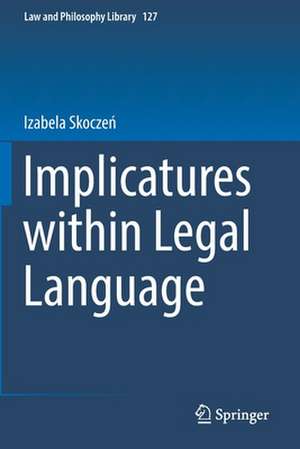Implicatures within Legal Language: Law and Philosophy Library, cartea 127
Autor Izabela Skoczeńen Limba Engleză Paperback – 28 oct 2020
| Toate formatele și edițiile | Preț | Express |
|---|---|---|
| Paperback (1) | 721.51 lei 6-8 săpt. | |
| Springer International Publishing – 28 oct 2020 | 721.51 lei 6-8 săpt. | |
| Hardback (1) | 728.28 lei 6-8 săpt. | |
| Springer International Publishing – 4 iul 2019 | 728.28 lei 6-8 săpt. |
Din seria Law and Philosophy Library
- 20%
 Preț: 813.11 lei
Preț: 813.11 lei - 20%
 Preț: 569.00 lei
Preț: 569.00 lei - 18%
 Preț: 1225.16 lei
Preț: 1225.16 lei - 18%
 Preț: 950.66 lei
Preț: 950.66 lei - 15%
 Preț: 583.43 lei
Preț: 583.43 lei - 15%
 Preț: 639.25 lei
Preț: 639.25 lei - 15%
 Preț: 641.53 lei
Preț: 641.53 lei - 18%
 Preț: 893.84 lei
Preț: 893.84 lei - 24%
 Preț: 797.39 lei
Preț: 797.39 lei - 15%
 Preț: 579.84 lei
Preț: 579.84 lei - 15%
 Preț: 644.95 lei
Preț: 644.95 lei - 18%
 Preț: 895.76 lei
Preț: 895.76 lei - 15%
 Preț: 644.95 lei
Preț: 644.95 lei - 20%
 Preț: 571.85 lei
Preț: 571.85 lei - 15%
 Preț: 642.03 lei
Preț: 642.03 lei - 18%
 Preț: 1232.26 lei
Preț: 1232.26 lei - 18%
 Preț: 1116.05 lei
Preț: 1116.05 lei - 15%
 Preț: 655.92 lei
Preț: 655.92 lei - 18%
 Preț: 833.54 lei
Preț: 833.54 lei - 18%
 Preț: 898.26 lei
Preț: 898.26 lei - 18%
 Preț: 1016.63 lei
Preț: 1016.63 lei -
 Preț: 390.25 lei
Preț: 390.25 lei - 24%
 Preț: 700.89 lei
Preț: 700.89 lei - 18%
 Preț: 999.60 lei
Preț: 999.60 lei - 18%
 Preț: 1115.77 lei
Preț: 1115.77 lei - 18%
 Preț: 1107.88 lei
Preț: 1107.88 lei - 15%
 Preț: 637.46 lei
Preț: 637.46 lei - 18%
 Preț: 781.94 lei
Preț: 781.94 lei - 24%
 Preț: 815.54 lei
Preț: 815.54 lei - 18%
 Preț: 786.18 lei
Preț: 786.18 lei - 18%
 Preț: 735.21 lei
Preț: 735.21 lei - 15%
 Preț: 653.33 lei
Preț: 653.33 lei - 18%
 Preț: 782.10 lei
Preț: 782.10 lei
Preț: 721.51 lei
Preț vechi: 879.89 lei
-18% Nou
Puncte Express: 1082
Preț estimativ în valută:
138.10€ • 150.06$ • 116.08£
138.10€ • 150.06$ • 116.08£
Carte tipărită la comandă
Livrare economică 21 aprilie-05 mai
Preluare comenzi: 021 569.72.76
Specificații
ISBN-13: 9783030125349
ISBN-10: 3030125343
Pagini: 172
Ilustrații: IX, 172 p.
Dimensiuni: 155 x 235 mm
Greutate: 0.27 kg
Ediția:1st ed. 2019
Editura: Springer International Publishing
Colecția Springer
Seria Law and Philosophy Library
Locul publicării:Cham, Switzerland
ISBN-10: 3030125343
Pagini: 172
Ilustrații: IX, 172 p.
Dimensiuni: 155 x 235 mm
Greutate: 0.27 kg
Ediția:1st ed. 2019
Editura: Springer International Publishing
Colecția Springer
Seria Law and Philosophy Library
Locul publicării:Cham, Switzerland
Cuprins
Introduction.- The Strategic Principle And The Maxim Of Selectivity.- Post Gricean Implicature Theories And Their Relevance For The Legal Realm.- Propositionalism And The Law.- The Meaning Of Law.- The Exchange Between Legislature And Courts – Examples Of Strategic Behavior From The Polish Legal System.- General Conclusions.
Notă biografică
Izabela Skoczeń is a researcher at the Department of Legal Theory, Jagiellonian University in Cracow. She works on the application of theories from the philosophy of language to elucidate issues in jurisprudence.
Textul de pe ultima copertă
This book proposes a novel, descriptive theory that unveils the linguistic mechanisms lurking behind judicial decisions. It offers a comprehensive account of the ongoing debate, as well as a novel solution to the problem of understanding legal pragmatics.
Linguistic pragmatics is based on a theory created by Paul Grice, who observed that people usually convey more than just the amalgam of the meaning of the words they use. He labeled this surplus of meaning a “conversational implicature.” This book addresses the question of whether implicatures occur in the legal language, firstly illustrating why the classic Gricean theory is not applicable (without substantial modification) to the description of legal language and proposing a novel approach based on a modification of Andrei Marmor’s “strategic speech.” Subsequently, it analyzes neo-Gricean theories and their limited use for describing the mechanisms of legal interpretation, and discusses the possibility of pragmatic enrichment of legal content as well as the notion of completeness of a legal proposition. Lastly, it illustrates how the developed theory works in practice, with examples from penal and civil law cases. The book is helpful to legal practitioners, since it provides insights into the reasons for and linguistic mechanisms behind courts’ decisions, but also to philosophers of law, philosophers of language, linguists and non-experts wishing to better understand the mechanisms of legal decision making.
Caracteristici
Presents a groundbreaking approach to legal pragmatics Unveils the mechanisms behind courts’ decisions Demonstrates an unique and novel approach to the meaning of legal implicatures
